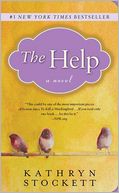So, I have a small timing issue (previously discussed on this blog) in which I do not read according to current bestseller lists. I wait a little while, try to give a book some time to breathe (for me to forget all the spoilers I think I have heard through my stopped up ears), and then I read.
The latest read to fit into this category of books for me is The Help. The ubiquitous read was EVERYwhere last year and the year before: book blogs, newspapers, morning television, etc. The furor was renewed with the creation of the motion picture adaptation. Which is what brought me on board.
I like to attempt to read the source materials for most of the movies (that have source materials) before I see the movie. In fact, I tend to refuse to see movies until I have read the book...yes, still waiting on The Maltese Falcon. So, since The Help (the movie) has been nominated for the Academy Award for Best Picture and I am going to the AMC Best Picture Showcase in a couple of weeks, I found myself with some reading to do!
Thankfully, the book is of the page-turning sort. It is a well told story, even if the dialect gets in the way a little bit.
I couldn't help thinking of my summers in Mississippi with my grandparents in the late 80s. Many of the vestiges of the racism that formed the struggle at the center of The Help, were still evident. A trip to the Piggly Wiggly with my grandmother was still included a chance to hear the n-word used, to see the lines drawn subtly between classes and races. My grandmother had a black woman to help her around the house on a weekly basis and this was still pretty common. My grandmother looked down on her, but also showed her kindness and a concern for her family that was palpable to a child under the age of ten. The contradictions inherent in these kinds of relationships were easily recognizable and equally infuriating.
I grew up with a strong aversion to racism and had a real-life struggle with friends at a young age that left an impression on me forever: that the lines drawn between people are often not drawn by others for us to see, but are drawn by suggestion. Some of us can overcome the power of that suggestion and shrug off stereotypes to examine people as individuals. Some of us cannot overcome the power of those persuasive influences and are doomed to follow in their opinions and actions. What it comes down to in the end is the question: are you going to follow or ar you going to lead?
The characters who form the center of The Help are of the latter group: leaders. They don't stand up and make speeches or try to force others to see things their way. Instead they live quiet lives of conviction and wait for others to catch on. I think it is this portrait of a leader in the midst of the civil rights era that has made The Help the phenomenon it is. There is something that resonnates in the queitly done everyday activities that change the way others think. It is leading by example, even if it looks like no one will follow. This is the type of person who really accomplished civil rights reform in America and Kathryn Stockett paints their portraits sharply and beautifully.
I am glad I read The Help and I really am looking forward to seeing the film. I am also interested in getting the audio version. Has anybody seen the movie or heard the book? Please let me know what you think.
Rating: 6 out of 7
-L


No comments:
Post a Comment